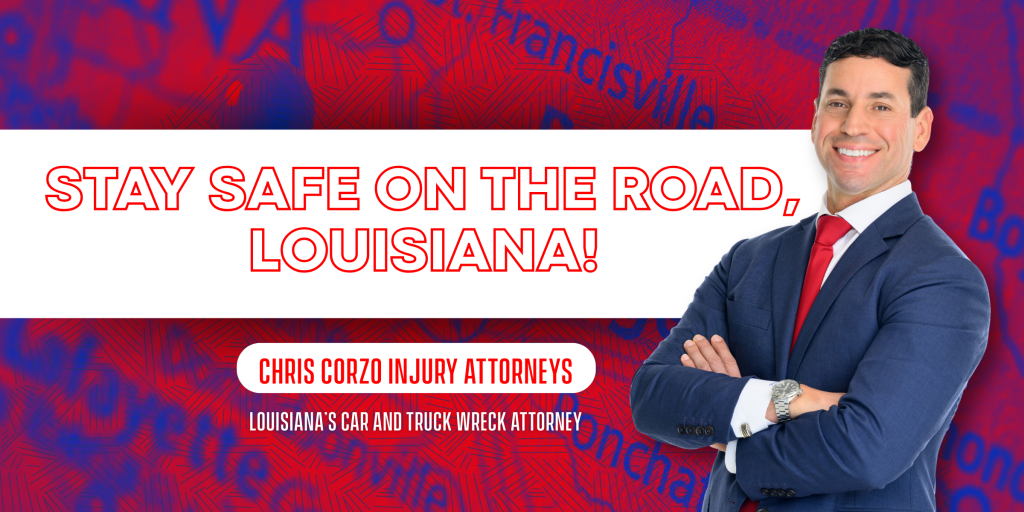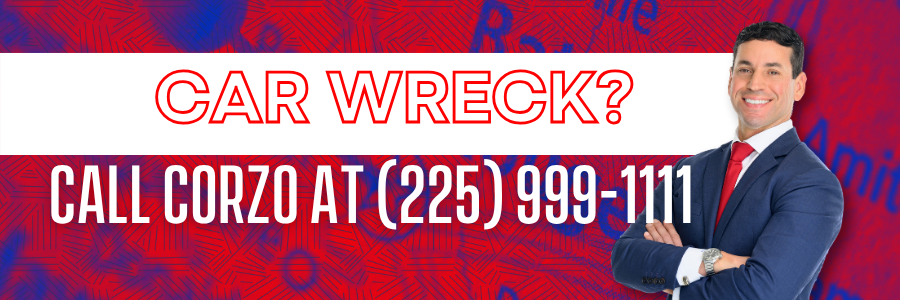When Louisiana drivers “spring forward” or “fall back,” crash risks change too. Even one lost hour of sleep can affect safety.Research shows crashes rise right after the time change. Small shifts in sleep and daylight affect alertness, focus, and reaction time.

A study by the American Economic Association found fatal crashes increase 6% during the week after the spring switch. Another study in Current Biology reviewed 732,000 crashes and found the same 6% spike, especially in the morning.
Louisiana Crash Trends After Daylight Saving Time (DST)
Locally, crash data from LSU’s Center for Analytics & Research in Transportation Safety (CARTS) and the Louisiana Department of Transportation and Development (DOTD) show a noticeable uptick in wrecks around the fall and spring transitions.
More evening crashes in November (after fall back) and more early-morning crashes in March (after spring forward).
When clocks “fall back” in November, evening commutes suddenly happen in near darkness. CARTS data shows a clear rise in evening crashes after sunset during this month. Drivers leave work around 5:00 p.m., but daylight disappears an hour earlier. More vehicles share dimly lit roads with pedestrians, school buses, and cyclists and visibility problems, glare from headlights, and fatigue combine to increase crash risk.
Related: Fall and Winter Car Safety Checklist
Pedestrian and rear-end collisions are especially common after dark in November. CARTS records show higher numbers of wrecks between 5:00 p.m. and 8:00 p.m. Many happen on major highways like I-10, Airline Highway, and LA-30 in Ascension and East Baton Rouge Parishes. Even minor fender-benders rise as drivers misjudge speed and distance in dim light.
When clocks “spring forward” in March, the pattern reverses. Drivers lose one hour of sleep and face darker mornings. CARTS data shows a noticeable increase in morning crashes between 6:00 a.m. and 8:00 a.m. that month. Fatigue and reduced visibility before sunrise are major contributors. Many crashes involve commuters and student drivers rushing to work or school.
The CARTS dashboard also shows weekday spikes during both transitions. Crashes rise sharply on Monday and Tuesday right after the time change. That’s when most people are still adjusting their sleep and daily routines.
Both patterns match national findings but appear stronger in parishes with heavy commuter traffic. Urban areas like Baton Rouge, Ascension, and Lafayette experience the highest impact. Rural parishes see fewer crashes overall but higher severity when wrecks occur at night.
Related: Seatbelts Save Lives and Your Claim
What Changes After the Clock Switch?
Even a one-hour time shift disrupts normal sleep and circadian rhythms. This disruption makes many Louisiana drivers feel groggy and unfocused. Sleep experts say your body’s internal clock struggles to adjust for several days, and warns that even small schedule changes cause short-term sleep debt.
Sleep debt slows reaction times and reduces alertness behind the wheel.
During the fall, this same period overlaps with Louisiana’s flu season. Flu symptoms like fever, body aches, and fatigue already weaken the body’s alertness. People recovering from the flu often experience fragmented sleep and lower energy for up to two weeks. Research from the Centers for Disease Control and Prevention (CDC) shows fatigue is one of the flu’s most common lingering effects. When that fatigue mixes with shorter daylight and a disrupted sleep cycle, crash risk rises sharply.
Related: Driving with Flu? That Sounds Like Danger
Who is Most Affected?
Young drivers (16–24) are nearly twice as likely to be drowsy at the time of a crash compared with drivers 40–59; they also report the highest rates of falling asleep at the wheel. This makes the week after a clock change especially risky for teen/college drivers.
Across U.S. fatal-crash data, men account for well over half of crash deaths every year; risk-taking behaviors (speeding, alcohol) are over-represented among male drivers. When sleep loss and darkness layer on after DST shifts, these baseline gaps can compound risk.
Bottom line for Louisiana: teens, young adults, and male drivers warrant extra caution the week after each clock change—especially early mornings in spring and evenings in fall.

Louisiana-Focused Safety Checklist
Before the Change
- Move bedtime 15–20 minutes earlier each night (spring) or reset evening routines (fall).
- Plan routes with better lighting and slower posted speeds; avoid long, monotonous night drives.
Related: New Roundabouts in Ascension Parish
The Week After the Change
- In the spring
- Leave home a little earlier.
- You might feel sleepy and react more slowly in the morning.
- Remember, coffee can’t replace real sleep
- In the fall
- It gets dark earlier, so watch carefully for people walking or biking.
- Look for crosswalks and driveways before turning or backing up.
- For teens
- Avoid late-night driving after games or work.
- Parents should remind teens about the dangers of driving when tired.
- Set clear rules about getting enough sleep before getting behind the wheel.
- For workers and companies
- If you drive for work, start a little later when possible.
- Supervisors can check how alert drivers feel before they leave.
- Avoid giving night-shift workers long or risky drives right after work.
- For everyone
- Make sure your headlights point the right way and are clean.
- Fix any broken lights so other drivers can see you.
- Keep your windshield clean to stop glare when the sun sets.
- If you walk or bike, wear bright or reflective clothes and carry a small light.
Final Thoughts
Daylight Saving Time may seem like a small change, but it can make a big difference on Louisiana roads. When we lose or gain an hour, our bodies need time to adjust. During that week, many drivers feel sleepy, distracted, or rushed—and that’s when wrecks are more likely to happen.
Good sleep, slower speeds, and better awareness save lives. Make sure your car lights work, clean your windshield, and watch carefully for others on the road.
The time change only lasts a moment, but safe driving habits can protect you all year long.
If you or someone you love is hurt in a car wreck, Call Corzo at (225) 999-1111 because help, respect, and justice are only one call away.
